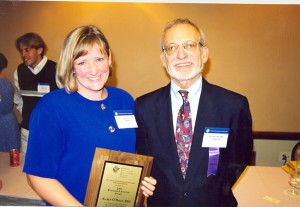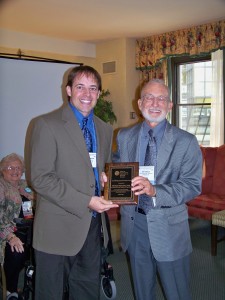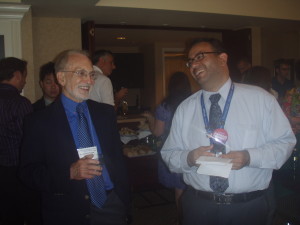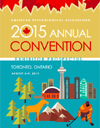On March 17, 2015, Raymond D. Fowler, PhD, former CEO and past president of the American Psychological Association, passed away at his home in San Diego, CA. APAGS is indebted to Ray, who was instrumental in the founding of APAGS.

Ray Fowler awarding Karen O’Brien with the Fowler Award at the 1997 APA Convention, Chicago, IL. Then Chair Mitch Prinstein is in the background.
In 1988, two students, Scott Mesh and David Pilon, were working with two psychologists, Ellin Bloch (Chair of Division 29’s Student Development Committee) and Pierre Ritchie (President of the Ontario Psychological Association) to encourage APA to develop a home for students within the organization. That year, Ray spoke at the Ontario Psychological Association’s annual meeting, and a snowstorm delayed his return home. During that extra evening, Pierre and David were successful in getting Ray’s support to create a student organization within APA. With the support of the 4 leaders, Ray secured additional interest among APA leadership for the new student group, and at the 1988 APA Convention, APAGS was founded by a unanimous Council vote (Mook, 1996).

Ray Fowler awarding Mitch Prinstein with the Fowler Award at the 2009 APA Convention, Toronto, ON.
When Ray became CEO of APA, he continued to support APAGS. He regularly visited APAGS during its business meetings, served as a mentor to numerous student leaders, and spoke at the Psychology Graduate Student Rally on Capitol Hill in August 2000. APAGS established an award for mentoring named in Ray’s honor in 1989 and presented Ray with the first APAGS Fowler Award. Since then, 26 faculty members have been honored with the highest award APAGS can bestow. Ray would come to APAGS events to personally recognize the winning mentor.

Ray Fowler with Nabil El-Ghoroury (Director of APAGS) at the 2010 APA Convention, San Diego, CA. This is the last APA Convention where Ray awarded the Fowler Award to the winning mentor.
I feel lucky that I knew you, Ray, when I was a graduate student leader in the early APAGS days. On behalf of over 26,000 current graduate student members, I would like to thank you for your constant support of APAGS and graduate students in APA! So many APAGS members benefited from your wisdom and generosity, and our condolences to your family.



 Attending
Attending ![MPj03169710000[1]](http://www.gradpsychblog.org/wp-content/uploads/MPj031697100001-300x201.jpg) of Convention. You can enjoy a free breakfast while listening to some of psychology’s most distinguished scholars speak in an informal setting.
of Convention. You can enjoy a free breakfast while listening to some of psychology’s most distinguished scholars speak in an informal setting.



 avel to Canada, the first thing you need is a passport. If you do not already have one, or need a replacement or renewal, you should definitely consider applying soon. Processing times take anywhere between 8 business days to 6 weeks depending on how urgent you need it. Get started today by visiting the
avel to Canada, the first thing you need is a passport. If you do not already have one, or need a replacement or renewal, you should definitely consider applying soon. Processing times take anywhere between 8 business days to 6 weeks depending on how urgent you need it. Get started today by visiting the 